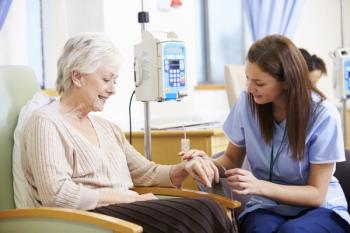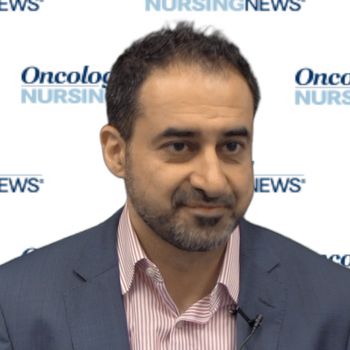
Laura Zitella, MS, RN, ACNP-BC, AOCN, reviews a case study where a 52-year-old female patient with metastatic colorectal carcinoma begins experiencing diffuse abdominal pain.

Laura Zitella, MS, RN, ACNP-BC, AOCN, reviews a case study where a 52-year-old female patient with metastatic colorectal carcinoma begins experiencing diffuse abdominal pain.

Oncology nurses found that the use of a flexible catheter for subcutaneous immunotherapy is linked with increased safety and satisfaction.

Very low dose radiation therapy was found to be an effective treatment approach in the palliative setting for patients with indolent non-Hodgkin lymphoma.

Michelle Mollica, PhD, MPH, RN, OCN, of the National Cancer Institute, discusses how childhood cancer survivors may face different challenges than adult or geriatric patients.

Ilene Galinsky, BSN, MSN, ANP-C, senior leukemia protocol research nurse practitioner, at Dana Farber Cancer Institute, discusses how treatment for patients with acute myeloid leukemia has evolved in recent years.

Oncology nurses are in less control of their communication environment compared with other health care providers; however, certain strategies can help them communicate effectively with their patients.

At the 47th Annual ONS Congress, CURE® Media group honored oncology nurses at their 2022 Extraordinary Healer® Award ceremony.

The most important thing that an oncology nurse can do to help a patient navigate their sexual health is repeatedly offer them permission to have conversations surrounding their health.

From medical information cards to visual cues, a nurse navigator offers advice on ensuring quality care for patients who do not speak English.

When in-person classes on central venous catheter care were limited due to the COVID-19 pandemic, educational videos became even more important.

Knowing your patient’s beliefs and goals is key to providing ethical cancer care.

Nurse practitioners are more valuable than ever in the world of cancer care.

Factors such as being younger in age, having more comorbidities, and more prior cancer treatments all contribute to higher levels of sleep disturbance in patients with gastrointestinal cancers.

In particular, patients reported improved knowledge in survivorship/surveillance and brain fog following the 6-week program.

When patients rely on lip-reading to communicate, mask mandates have major effects on their care.

The “cheat sheet” assisted advanced practice providers using a step-by-step guide that is updated frequently to allow for the most up-to-date information.

A recent study analyzed the benefits and work-related stressors of end-of-life care.

Due to the COVID-19 pandemic, many patients’ and survivors’ care has changed, but one nurse and her team sought to make this population more comfortable and safe during these times with virtual visits.

Early research showed an improvement in provider recommendations of care for patients with breast cancer based on eight guideline metrics.

Survivors of cancer go through coping during the first year after treatment and require specific resources. But these were limited due to the pandemic resulting in survivors self-coping with known mechanisms.

The current scale often used to measure nurse quality of life may be missing some key factors, according to recent research.

The use of a smartphone mobile app showed that patients with cancer had higher adherence to oral chemotherapy regimens, especially when it came to safely monitoring chemotherapy toxicity and symptoms in real time.

A walking program dramatically increased the number of steps walked by patients being treated for hematologic malignancies.

Data presented at the Oncology Nursing Society’s 46th Annual Congress demonstrates that there is low level evidence that suggests medical marijuana or cannabinoids may reduce chemotherapy-related adverse events in patients with cancer.

While staff at a NCCN-designated oncology center responded positively to a new Chemotherapy Education Policy, its implementation did not increase the quality of education or decrease the incidence of “same day chemo teaches,” according to data presented at the ONS Annual Congress.

Certified nurse specialists play a crucial role in their institutions achieving Disease-Specific Care certifications – which can ultimately improve patient outcomes.

A poster presentation from the Oncology Nursing Society’s 46th Annual Congress describes a single-center clinician education program aimed at improving patient satisfaction.

A clinic for patients with a history of cancer led by an advanced practice nurse and a dietician may empower patients to improve their lifestyles through diet and exercise, especially since it may have an impact on their outcomes and future risk for diseases.

Cognitive behavioral therapy help to improve the lives of patients experiencing cancer-related fatigue.

Nurses should be aware of patients who are at risk for immunotherapy-related myocarditis.